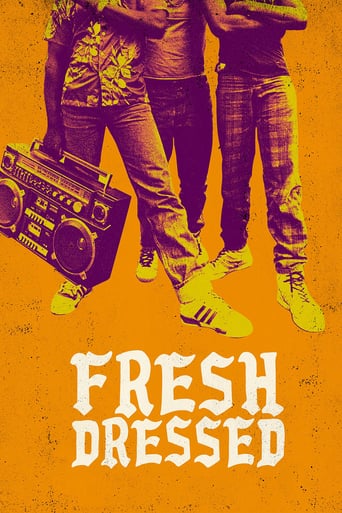politic1983
Sacha Jenkins is a journalist I have heard of. I have two books that he co-wrote, in fact: one about hip hop; the other about racism. Both are hilarious. But there's more to Jenkins that cheap laughs, a mainstay of hip hop journalism in the Nineties, he is a man that can speak with authority about hip hop: old school, new school, true school, take you to school. So, apparently there hasn't been a documentary made about hip hop fashion. Well, there has now. Attire has always been an important part of hip hop, from the olden days of early B' boys, to the designer brand-obsessed raps of the Nineties, to idiotically-dressed pop figures, such as Kanye West and Pharrell Williams. And this is where the film starts.To start, I was confused. The opening credits, featured embedded interviews with West, Williams and Sean 'Puffy' Combs, of whatever he goes by these days. My expectations from the title and promotional literature I had perused suggested that this would largely be a film about the 'fresh' Eighties, with a 'where'd you get those?' outlook. Instead, I was seeing modern-day megastars discussing their definitions of 'fresh.' But then things arrive where I was expecting them to be. Starting off with the days of slavery Jenkins does a quick tour of American history, most specifically African-American history, starting with the ideas of 'Sunday best', moving through various musical ages, before approaching the Seventies and the advent of hip hop, and more importantly, its style borne of gang culture. He then moves to the Eighties, and Dapper Dan's 'improved' Louis Vuitton styles that features heavily on many a classic rap album cover.But then, as with hip hop, we go mainstream as we enter the Nineties, focusing on brands like Cross Colours and Karl Kani, as designers matched their styles to rappers, ensuring that every item they wore heavily featured their brand - something that rappers were only too happy to oblige with. But things have moved very quickly here, and the vast majority of the film is interviews with designers, and the hip hop figures that have crossed-over into fashion. Business takes over, with discussions about how best to market your brand / oneself. Sean Combs becomes a central figure of the documentary, discussing his cross-over success, now more an entrepreneur than rapper. This focus disappoints for me. I was much more expecting an exploration of kids' homemade styles, customising their gear to ensure they are fresher than fresh. Instead, this is more an exploration of a small section of the fashion industry, with lots of interviews with middle-aged business executives. It seems that, with the help of Executive Producer Nas, Jenkins makes the most of the interviews he got with some A-list names. But this is Sacha Jenkins we're talking about here, and so all this business talk is put into a context. Combs, with Sean John, has been a success in 'hip hop fashion', but it seems a lot of his success is due to dropping the hip hop associations. With its Nineties peak, hip hop dominated fashion, with rappers in ads everywhere and big name designers following rappers. Rappers, in turn, set up their own brands, most of which lived short lives. The major labels will always be there, but their association with hip hop was a temporary fad, with more conventional styles the new order of the day. What starts as innocent Eighties 'freshness' moves to Nineties 'ghetto fabulous' to big money making. The times have changed, and with kids customising their gang colours, owning one's rivals clothes was a sign of conquering their turf. But now, kids get killed over coats of brands they can barely pronounce. Just like hip hop, creative innocence has been lost to the quest for money, making this a hip hop story through-and-through. Though maybe a little more of the old would have made this a little more fresh. politic1983.blogspot.co.uk
subxerogravity
I'm old enough to remember some of the things that the documentary is talking about and old enough to experience some of the other things, so it was cool to see the doc and reminisce over were I was at in my life at the time. Plus, the documentary gives me this behind the scenes look of what I only knew from a consumers stand point. Of course my favorite part was the stuff I did not know or vaguely remember, that takes us back to Hip hop's golden era. Hip Hop is getting old and now becoming history, no longer considered a fad by the mainstream media that said it was when I was growing up.The documentary shares a lot of Old School footage with another documentary called Rubble Kings, which is about how gang violence turned into Hip Hop. This movie touches on that too, but from the prospective of Fashion.The movie does really work if you're into fashion as it goes through the trends of Hip Hop from the core beginnings to the present. Although, I feel that they did kind of speed through certain trends in order to showcase more so the men and women behind Hip Hop fashion, especially those from the black community. Which was great, cause for me I knew the names of these guys but not the faces and their originsI'm definitely glad to see docs like this are coming out about the history of Hip Hop



